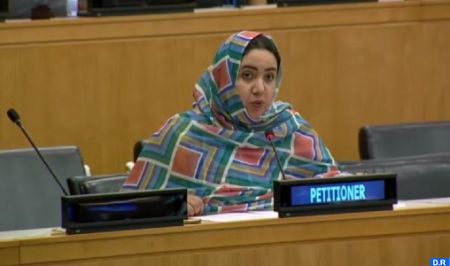C24: Ghalla Bahiya Highlights Growing International Support for Moroccanness of Sahara
Vice president of the Dakhla-Oued Eddahab region, Ghalla Bahiya, highlighted, Monday before the members of the Committee of 24 (C24) of the UN, the growing international support for the legitimacy of Morocco’s rights over its southern provinces and the autonomy plan as the only solution to the regional dispute over the Sahara. Speaking at a meeting of the C24 held in New York, as the democratically elected representative of the population of the Moroccan Sahara, Bahiya said that this recognition has been crowned by the very broad support from the majority of African, Arab, European countries and other regions, as well as the inauguration of 25 consulates general in the cities of Dakhla and Laayoune. She noted, in this context, that the momentum in favor of the autonomy plan “gives hope to the population of the region that a political solution to the regional dispute over the Sahara is closer than ever, to end a situation that has lasted too long”. The Moroccan Saharan politician pointed out that the recent decision of Spain to give its unambiguous support to the autonomy plan as the most serious and credible basis for resolving this regional dispute is a “historic step” that the UN and the C24 should consider to close this issue. “The strong and sovereign decisions of the United States, France, Germany, the Netherlands, Romania and Spain, most Arab countries and a large number of African states in support of the autonomy plan respond to this reality on the ground, far from the ideological dogmatism still practiced by a handful of countries,” she explained. She emphasized that all these developments confirm the irreversibility of the Moroccanness of the Sahara and the autonomy plan as the only outcome of the UN political process on the issue of the Moroccan Sahara. Referring to the emancipation of women in the southern provinces, Ghalla, said she is part of a generation of Moroccan women who play a key role in the development and implementation of national development policies, as part of the High Vision of HM King Mohammed VI for gender equality as a basis for a modern and democratic society.

